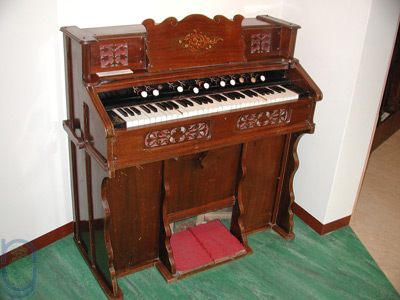
A reed organ is one which produces sound from brass reeds rather than pipes. There are two distinct classes of reed organ which can generally be identified by their appearance:
American Organ - These are the type most commonly found in churches or in the home. The defining feature is that they suck air through the reeds when played, producing the characteristic nasal tone.
They are normally shaped roughly like an upright piano, frequently with an ornate top fitted with turned bobbins, fretwork panels, mirrors etc. An American name or location (eg Estey Organ Co. Brattleborough) written above the keys would be an indication, although some had the name of the importer which is misleading.
We frequently repair or restore these american organs for private clients who have inherited one or purchased out of interest.
Harmonium - This is a vastly superior instrument, normally made in either France or Germany. In this case air is blown through the reeds, producing a very engaging rich snarling tone.
Identification is easy, they are rarely more than 3' high, usually highly polished cabinetwork with a flat top which folds back to reveal the Ivory keys. Internally they are beautifully built, with maple veneer, purple leather gaskets and polished brass and steel components.
A full restoration service is offered for these instruments including re--veneering of casework where necessary, replacement key ivories, leathering bellows etc.
For enthusiasts, we also supply materials such as rubbercloth, springs, felt and leather, and spare reeds, and can source complete instruments, sometimes with two manuals. Please contact us with your requirements.
REED ORGAN FAULTS - A guide to common problems
| Description of Fault | Cause |
|---|---|
Pedal(s) dropped down |
Webbing strap or return spring broken |
Pedalling has little or no effect |
Non return valves rotted or bellows split |
Bellows soon runs out of air if you stop pedalling |
Holes in bellows, or severe woodworm in the instrument. |
The stops don't seem to do anything * |
Broken springs on the reed 'mutes' which would normally shut stops off when pushed in. |
Weak tone (lack of pressure/ vacuum) |
Faulty or broken bellows springs |
Key stays down (note sounds continuously) |
Key has been struck too hard, so pallet valve is now lodged open. |
Certain notes are silent, or sound unusual |
Usually dirt on reeds causing tongue to jam, can also be bent tongue due to fatigued metal. |
*Some stops are not intended to produce a sound. For example: